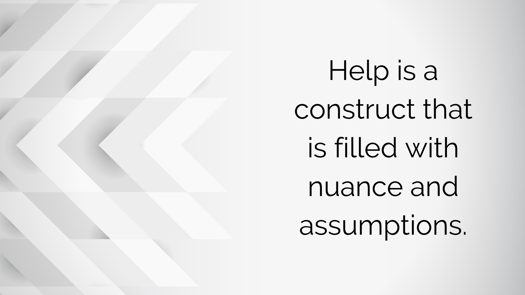
I remember anxiously sweating as I prepared for the client's meeting because no one was getting back to me about the agenda, and this was an important meeting…or so I thought. It turns out the meeting had been canceled, but my primary contact forgot to tell me. Has that ever happened to you?
Why was I anxious, and why was I sweating? Because I cared deeply about this meeting and the opportunity to facilitate the stakeholders through a complex decision. This showed me that it was just one more indication that they weren't prioritizing this transformational work. There were other signs for sure, but in that moment, I realized that I cared more about the outcomes than they did.
In process consulting, we adhere to 12 core competencies under the behaviors of Listening, Helping, and Learning. Helping, in particular, is a construct that is filled with nuance and assumptions.
At what point is "helping" co-dependent, robbing the client of ownership and agency? Have you ever encountered aggressive helpers at home, in the workplace, or community? It doesn't feel good. In that case, the helping is more about them and less about you. On the flip side, if you are struggling and really need help, you may be reluctant to ask for fear of being perceived as needy or incompetent. Often, the first step in hiring a consultant is for someone in a leadership position to admit they need help. It can be humbling.
In the consulting world, we might be valued for our expertise or wisdom, but honoring the existing organizational wisdom and walking alongside a client through the transformation is much more lasting and fruitful than providing ready-made answers. It is the client's journey, after all.
The angst-filled situation I described earlier happened when I was a fairly new consultant, and the taste of that lesson has lingered. Now, I craft agreements with clients that are client-owned and client-inspired. Their action is baked into the agreement with clear mutual expectations. We go beyond what they say they need to do to identify what they are willing to do.

Here are a few key questions I ask at the proposal stage to assess the client's agency and inspiration to complete the work:
- Why are you entering this agreement, and why now?
- Who are the key decision-makers, and who are the daily shepherds of this process? Who will gather the necessary resources (funding, people, data)?
- What steps will you take to ensure a transparent and inclusive process? What would it look like to truly and joyfully own the outcomes when I am gone?
So, reader, how may I help you?
If you would like to schedule a 30-minute call to learn more about how we can help you gain clarity and deepen your capacity to adapt to the changes around you, I invite you to reach out to schedule time for that conversation. It would be an honor to walk with you. Please reach out to me at kims@designgroupintl.com. It would be an honor to walk with you.
Walking alongside you,

 Kim Stezala
Kim Stezala
Design Group International
Senior Design Consultant
Dig Deeper:
Want to explore more on this topic? Take a look at these resources:
- "Helping is a performance art laden with often mis-aligned expectations…The helper must vary their behavior according to the stream of feedback signals." from Process Consulting Revisited: Building the Helping Relationship by Ed Schein.
- A scholarly article about proactive and reactive help in work settings: Lee, H. W., Bradburn, J., Johnson, R. E., Lin, S.-H. (J.), & Chang, C.-H. (D.). (2019). The benefits of receiving gratitude for helpers: A daily investigation of proactive and reactive helping at work. Journal of Applied Psychology, 104(2), 197-213.m
Process Consulting competencies identified and implemented through
the Society for Process Consulting.
Tags:
process design, process consulting, kim stezala, Design Group International, listening, helping, learning, Ed Schein, organizational consulting, business consulting, hiring a consultant, workplace dynamics, client-owned, helping professions, Walking Alongside Blog
June 2, 2021

Comments